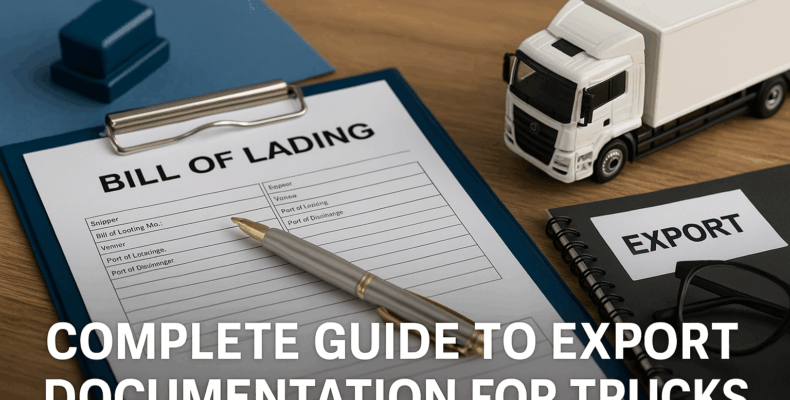Complete Guide to Export Documentation for Trucks: What Every Global Buyer Needs to Know
Buying a used truck from Japan can be a smart investment. However, to avoid delays, surprises, or extra costs, it’s critical to understand the export documents involved.
This complete guide explains every key document you’ll need when purchasing a truck from Japan. Whether you’re importing to Kenya, Zambia, the Philippines, or anywhere else, this guide will help you get ready and stay compliant.
Why Export Documentation Matters So Much
Smooth shipping and import clearance depend on proper paperwork. Missing or incorrect documents can result in border delays, storage fees, or even refusal of entry.
That’s why partnering with a trusted exporter is so important. If you’re not sure who to trust, begin with this list:
👉 Top 5 Trusted Japanese Used Truck Exporters for Global Buyers
These professionals ensure all documentation is accurate, complete, and tailored to your country’s rules.
1. Export Certificate (Japanese Title – “JDM Shaken”)
This is one of the most important documents. It confirms the truck’s ownership history and technical specifications in Japan.
You will need this certificate to register the truck in your country. It usually includes:
-
Chassis number
-
Engine model
-
Year of manufacture
-
Odometer reading
-
Previous registration details
✅ Always check that the chassis number matches the truck itself.
2. Bill of Lading (B/L)
The Bill of Lading is issued by the shipping line. It acts as proof that the truck was loaded onto the vessel and provides:
-
Buyer and seller names
-
Port of loading and discharge
-
Truck details (make, model, chassis number)
-
Vessel and voyage information
You’ll need this to clear the truck at your port of entry.
3. Commercial Invoice
This invoice is provided by the exporter. It shows the agreed price, currency, payment method, and the truck’s basic details.
Your local customs office will use it to calculate import duties, VAT, or other fees.
4. Packing List
The packing list is often included with the invoice. It describes the contents being shipped and how they are packed.
Although optional in some countries, this list helps customs confirm the shipment matches what’s described on the invoice.
5. Export Permit and Customs Clearance
Before the truck leaves Japan, the exporter must get clearance from Japanese customs. This process includes:
-
Vehicle inspection
-
Submission of export application
-
Confirmation of no outstanding taxes or loans
Without this step, the truck cannot leave the country legally.
6. Inspection Certificate (If Required)
Certain countries—like Tanzania, Kenya, Zambia, and Uganda—require pre-export inspections. These are usually conducted by third-party agencies such as JEVIC or QISJ.
These checks focus on:
-
Roadworthiness
-
Emissions standards
-
Safety equipment
Your exporter will help schedule and manage this inspection if your destination requires it.
7. Translation of Key Documents
In many cases, a translated copy of the export certificate or invoice is needed for customs or registration in your country.
Thankfully, most top exporters include English translations.
That’s another reason why you should choose a professional exporter. Start here:
👉 Top 5 Trusted Japanese Used Truck Exporters for Global Buyers
8. Optional Documents That Add Value
Some exporters provide extra documents, such as:
-
Auction Sheet – shows pre-sale vehicle condition
-
Maintenance records – proves regular servicing
-
Photo inspection reports – gives added peace of mind
These documents aren’t always required, but they help build buyer confidence and support resale value in your country.
Final Tips for Hassle-Free Truck Importing
-
Double-check that the exporter uses your correct name and address on all forms.
-
Confirm shipping dates and timelines before payment.
-
Ask for scanned copies of all documents before the truck is shipped.
-
Know your country’s import laws and fees.
When you work with a reliable partner, the process becomes smooth and worry-free.
Conclusion: Proper Documentation = Successful Delivery
Importing a truck is more than just choosing the right vehicle. The paperwork matters just as much.
From the Export Certificate to the Inspection Report, every document plays a role in getting your truck from Japan to your doorstep safely and legally.
If you’re ready to begin, check out this trusted list of experts:
🔗 Top 5 Trusted Japanese Used Truck Exporters for Global Buyers
Let the professionals handle the paperwork—so you can focus on growing your business.
